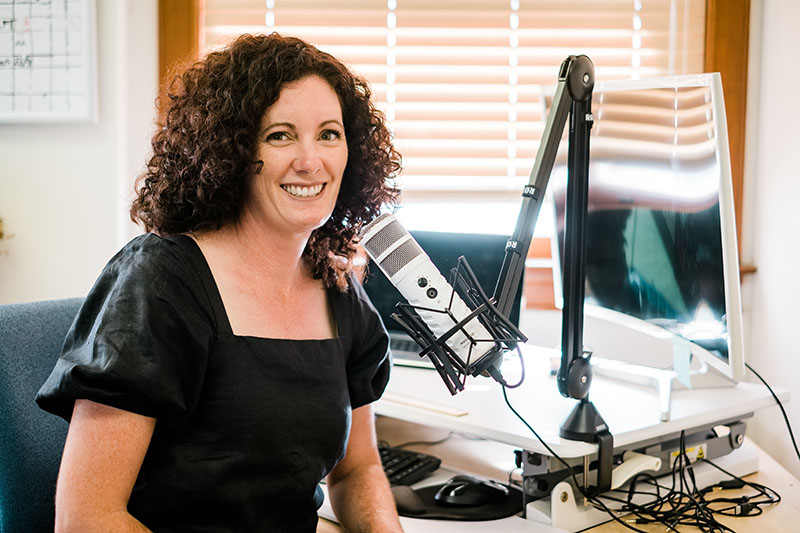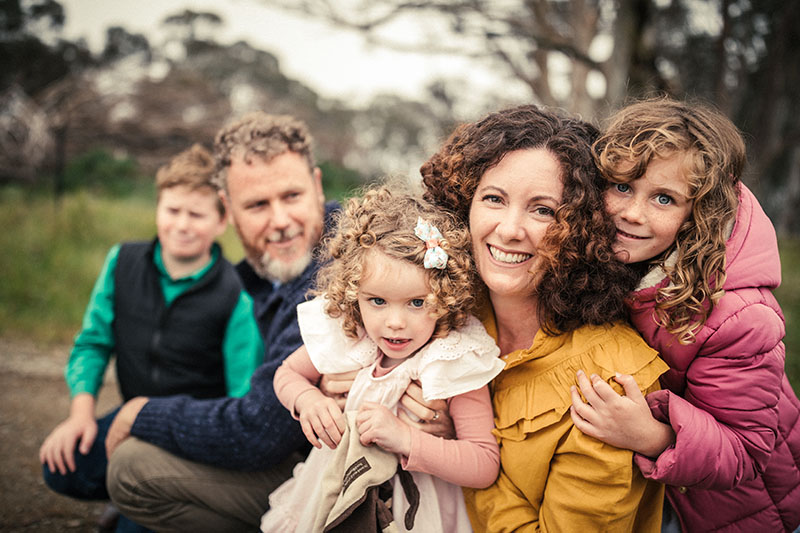2022 UNE Rising Star Award winner - Ms Shonelle Gleeson-Willey
In recognition of her professional leadership in the environmental industry and her innovative approach to fostering a work-life balance.
Working in the environmental space in the current climate may not readily appear an optimistic pursuit. Even committed “eco-warrior” and mother of three Shonelle Gleeson-Willey admits to finding the outlook “somewhat dire”.
“It’s a race against time,” says the 2022 UNE Rising Star. “We are too far past the point of limiting global warming to a level that will enable us to maintain our current environment and lifestyles. But there is still hope for the future.”
Every day, in small and larger ways, the Tamworth-based environmental consultant maintains her enthusiasm for a brighter future. Through her firm Moss Environmental, Shonelle and her team promote international best-practice landscape management and education across the country. Her regular podcast – Beyond the Green Line – also shares inspiring stories from some of Australia’s “leading change-makers, industry experts and everyday activists in environmental sciences”. And through her own choices Shonelle endeavours to demonstrate the power of the individual.
“There is a common myth that, as an individual, you can’t make worthwhile change or really have an impact, but I don’t believe that’s true,” she says. “Collectively, we can have considerable impact, so I try to do as much as I can personally to limit my environmental impact and improve the environment around me.”
“I’m considering a PhD that looks at ways to adapt to or possibly even reverse climate change, if it’s at all possible. We have to have hope.
In the near future that is likely to entail enrolling in a Masters of Climate Change and one day even completing a PhD. “We need more research on how to limit global warming and the changes we are seeing,” Shonelle says. “I’m considering a PhD that looks at ways to adapt to or possibly even reverse climate change, if it’s at all possible. We have to have hope.”
But this UNE Masters of Environmental Management graduate is also a realist. “Since establishing the business in 2015, as one of the first SMART Region Incubator founders, I have actively made choices of which clients we will and won’t work for, based on my own values, which are replicated in our company values,” Shonelle says. “My approach has always been to see the best in people and to give them the benefit of the doubt. But sometimes, on the back of a project for a client, it’s clear that no matter what help or education we give them, their behaviour will never change. On the flipside, when we see corporate change happening, then we know we are contributing to positive outcomes.”
A dedication to quality and safety, a continual growth mindset and an adventurous spirit underpin the business developed by this self-professed adrenaline junky. “Adventure is one of the core values for my team,” Shonelle says. “I don’t mean jumping out of an aeroplane, but being comfortable enough to put yourself out there and take on challenges, which to me are a form of adventure. We often take on projects for which there is no formula, no set solution. As scientists, it’s our job to help find one. A small business is always an adventure; it changes from week to week and you have to be up for the ride.”
Moss Environmental staff work with local councils, State Government departments, construction and mining companies, and local businesses on a range of infrastructure, education and capacity-building projects. Various internal practices, including ISO accreditation, in-house training, mentoring, monthly one-on-one chats and individual education budgets, support the talents and ambitions of employees.
“Nobody is likely to spend their whole career with the one company these days,” Shonelle says. “I try to help staff to be the best they can be while they are with our company, but also assist them to identify where they want to go and put them on that path. Growing your people is important, because that’s what creates the culture for the next person. I have had some amazing mentors and external mentees throughout my career and it’s an important part of my role to give back and pass that on.”
Being regionally based has both professional and personal advantages. “I love this environment, the big, open plains and towering eucalypts, and all the different systems that connect to make up its landscapes and communities,” Shonelle says. “And I am pleased that we can offer local understanding, access and expertise to clients based in the cities.”

Shonelle's regular podcast – Beyond the Green Line – also shares inspiring stories from some of Australia’s “leading change-makers, industry experts and everyday activists in environmental sciences”.
Shonelle is heavily involved with industry associations – the Environment Institute of Australia and New Zealand, and International Erosion Control Association – and last year took out the Business NSW Award for Outstanding Business Lead and was a finalist in the Tamworth Quality Business Awards’ Employer of Choice category. She also won the National Association of Women in Construction Crystal Vision Award in 2020.
Escaping to (relatively) untouched environments – either mountain-biking or back-country skiing – provides the ideal adrenaline rush for Shonelle these days, but even then, her protective instincts kick in.
“In 2020 I realised a life-long dream when I visited Antarctica with my son. It was an absolutely amazing experience to see an environment so little changed by humans, but also really devastating to see the impacts we have had. I had thought it was the final frontier, but there are a lot of old research stations and at one of the old whaling stations, the slick from the whale blubber was preserved in the ice.
“Our civilisation’s history is fascinating and the research stations are crucial to being able to understand and protect such a hostile environment. However, my experience illustrates the past environmental damage done through a lack of understanding and why we must continue to emphasise the importance of the professional environmental practice of sympathetic contaminated land management and remediation for fragile and unique environments.”


